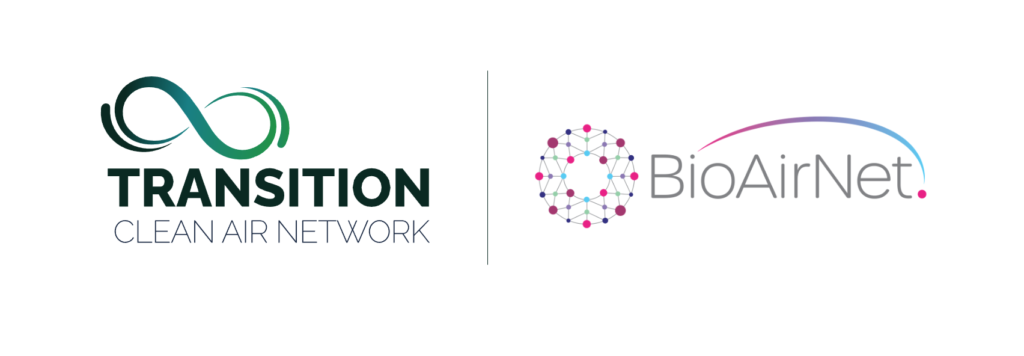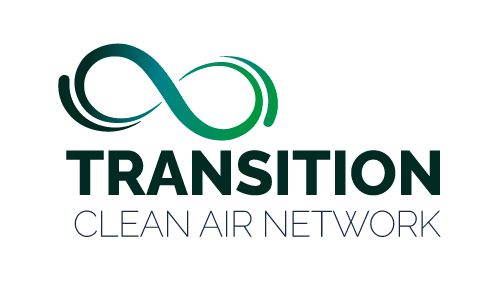Joint Discovery & Innovation Funding
 Following the success of the TRANSITION Clean Air Network’s first-round Discovery & Innovation projects, TRANSITION is teaming up with BioAirNet to fund a joint £20k (@80% FEC, incl. VAT) project focusing on exposure to both chemical and biological aerosols in a public transport environment.
Following the success of the TRANSITION Clean Air Network’s first-round Discovery & Innovation projects, TRANSITION is teaming up with BioAirNet to fund a joint £20k (@80% FEC, incl. VAT) project focusing on exposure to both chemical and biological aerosols in a public transport environment.
TRANSITION and BioAirNet held a joint workshop on 18th Jan 2022, Future mobility beyond COVID-19 – two steps forward, one step back for clean air and public health; the slide deck is available here. This call for applications is a response to that workshop – see below for the full brief.
It is an open call: anyone from an organisation normally eligible for UKRI funding can apply, subject to standard UKRI terms and conditions, but any one organisation can only submit one application. To apply, please return a completed Application Form to info@transition-air.org.uk by 12 noon 31st Oct 2022.
Brief
Applications are sought for a proof-of-concept project to develop a capacity (technological and/or methodological) to assess the efficacy of one of more potential mitigations of exposure to both chemical and biological aerosols in a public transport environment.
Said capacity should provide a clear pathway towards a solution to a specific industry need for COVID-19 recovery in the public transport sector (i.e., increased use of public transport, leading to increased revenue, enabling and/or accelerating cleaner fleet renewal).
This capacity may comprise measurements and/or numerical modelling, but must address exposure to all three categories of pollutant below:
(1) Conventional gas-phase pollutants (NOx, CO2, VOCs etc)
(2) Transport-derived, non-biological particulate matter (PM)
(3) Biological aerosols* (including bioPM and exhaled droplets)
*Aerosols or airborne particulate matter of biological origin (e.g., bacteria, viruses, fungi, pollen)
As a proof of concept, this capacity should include – or at very least not preclude future inclusion of – chemical interactions between (1), (2) and (3) above.
Applicants should specify the public transport environment (in-vehicle or transport hub), at which their mitigation-assessment capacity is targeted; e.g., ‘onboard an electric bus’ or ‘in a train station waiting room’.
Applicants should also specify the potential mitigation(s), the efficacy of which their capacity is designed to assess. Potential mitigations may be technological, regulatory or behavioural in an effort to reduce emissions of, and/or exposure to, all three categories of pollutant listed above; i.e., potential mitigations of, for example, only (1) and (2) but not (3) are not sufficient.
Outputs
We recognise that the nature of the outputs will reflect the nature of the proposed project but, at minimum, these should include:
- Full Project Report – made freely and publicly available
- One-page Fact Sheet – made freely and publicly available
- All measurement/modelling data should also be made freely and publicly via CEDA
- Presentation by lead applicant at a joint TRANSITION-BioAirNet event in 2023
Timescales
The project must be completed (i.e., all outputs delivered) between 1st Jan and 30th Jun 2023. Meanwhile, the deadline for applications is 12 noon 31st Oct 2022 and we will let you know the outcome of your application by end of Nov 2022; we may ask you for further information/clarifications in the process of assessing your application. If successful, we will work with you to have a contract in place for you to begin by 1st Jan 2023.
Administration
The project will be administered by the University of Birmingham, in partnership with Cranfield University. For any queries, please contact info@transition-air.org.uk .
Clean Air Programme
The Clean Air Programme is a £42.5 million research and innovation investment supported through the UKRI Strategic Priorities Fund. The aim is to bring together the UK’s world class research base and support high quality multi- and interdisciplinary research and innovation to develop practical solutions for today’s air quality issues and equip the UK to proactively tackle future air quality challenges.
CONTACT
Institute of Applied Health Research
University of Birmingham
Edgbaston B15 2TT
Email: info@transition-air.org.uk
Follow us
Clean Air Programme
The Clean Air Programme is a £42.5 million research and innovation investment supported through the UKRI Strategic Priorities Fund. The aim is to bring together the UK’s world class research base and support high quality multi- and interdisciplinary research and innovation to develop practical solutions for today’s air quality issues and equip the UK to proactively tackle future air quality challenges.
CONTACT
Institute of Applied Health Research
University of Birmingham
Edgbaston B15 2TT
Email: info@transition-air.org.uk

![UKRI_NER_Council-Logo_Horiz-RGB[W]](https://transition-air.org.uk/wp-content/uploads/2020/11/UKRI_NER_Council-Logo_Horiz-RGBW-300x76.png)


